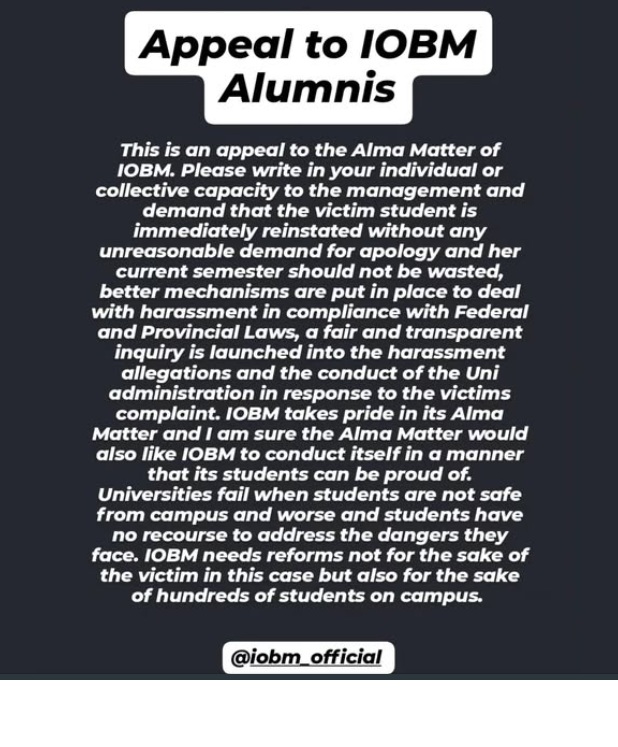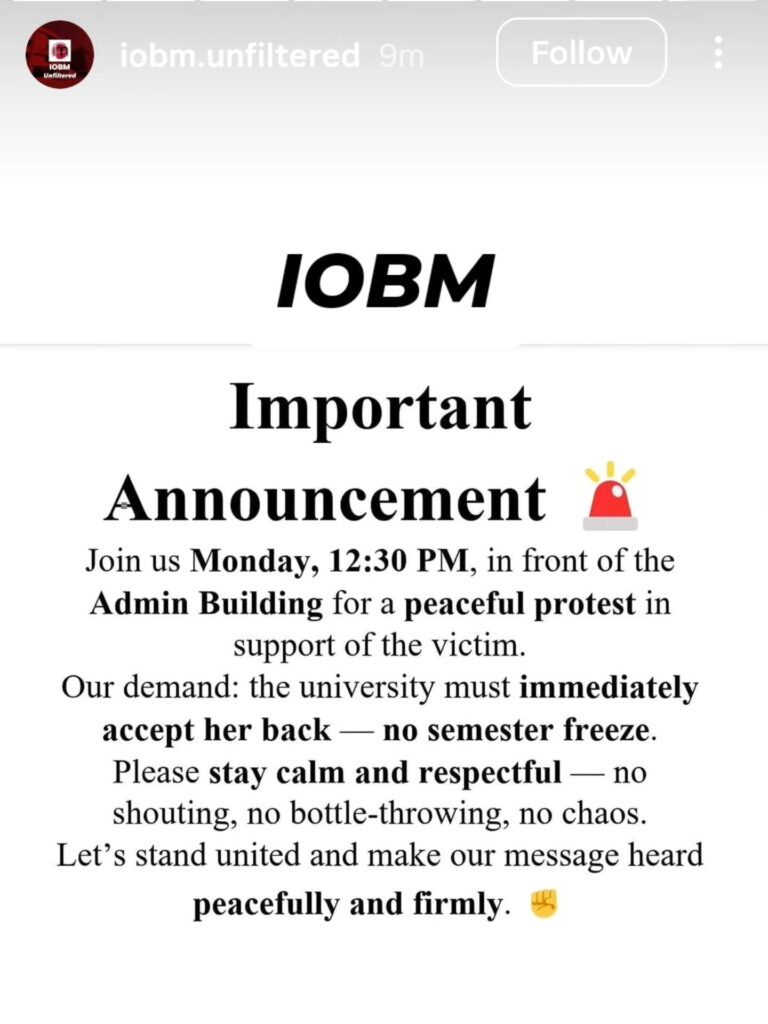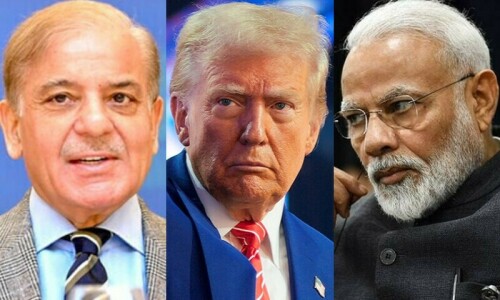Despite absence of students union, the recent student-led protest at Karachi’s Institute of Business Management (IoBM) has brought up an important topic about the power of unity and the necessity for institutions to be held accountable. This is especially essential in a country where student unions have been absent for almost 40 years. A female student started a movement that not only challenged the university’s judgement but also showed how badly private universities deal with harassment allegations.
Despite having a law against sexual harassment at the workplace, most of the educational institutions in Pakistan don’t have the Harassment complaint committees, which is mandatory for all public and private institutions in Pakistan.
The trouble at IoBM started when a female student complained on social media that she was being harassed by a staff member in the transportation department of IoBM. Instead of making sure that her complaint was fairly looked into, the university management allegedly called the student “disrespectful” and kicked her out of the university. This response, instead of safeguarding a possible victim, sent a scary message: students could lose their education if they spoke out against harassment.
But this time, the administration’s usual plan did not function as planned. The victim girl posted on her X account about the university’s decision to expel her. The students from all departments reacted fiercely. They came together to protest, saying that the expulsion was not fair. They got together on campus, spoke out online, and asked for justice for their universitymate. Their support and determination made the administration rethink its choice. Reports say that the staff member accused of harassment was fired and that the expulsion order was taken back.
This result is a rare and strong illustration of how students can hold each other accountable, even if there is no formal student union.

Jibran Nasir, a human rights lawyer and activist, said that universities in Pakistan have long thought that “students can be isolated, picked out, and bullied” because there are no student unions to protect them. This assumption has been shown to be false by the IoBM case.
IoBM’s students showed that power does not always come from formal positions or union offices. It can also come from a group conscience and moral clarity. Their peaceful protests not only forced the administration to do something, but they also had an impact well beyond the university’s boundaries. It was a moment of truth for all of Pakistan’s higher education system, where harassment, lack of transparency in administration, and unfair punishments are all too typical.
This was not the first time a Pakistani university had punished someone harshly for speaking out. A male student at the Institute of Business Administration (IBA) Karachi was sent out in 2021 after publicly claiming that a top official was harassing a female staff member. The student was only reinstated after a lot of protests from other students, media coverage, and investigations undertaken by Jibran Nasir and others. The authorities who were charged were found guilty of harassment.
University administrations too often choose to silence opposition instead of making sure that everyone is treated fairly and that there is no harassment, complaints about facilities, or arbitrary disciplinary actions. The IoBM incident serves as a recent reminder that, in the absence of substantial student participation, the balance of power remains significantly skewed in favour of an administration that lacks accountability to its respective communities.
The IoBM students’ protest was brave and well-organised. Even though they did not have a formal union, they worked well together, kept putting pressure on the administration, and did not let themselves be scared. In the end, their tenacity made the institution change its mind completely, going from threats and requirements for reinstatement to a full, unconditional revocation of its earlier decisions.
This was a “big win for IoBM students,” as Jibran Nasir noted, but changes are still needed. The initial actions that need to be taken are to bring back the expelled student and fire the staff member who was charged. However, these steps are not enough. If IoBM and other universities don’t set up clear, fair, and independent ways to deal with allegations of harassment, such things will keep happening.

Protest, albeit potent, cannot serve as the sole avenue to justice. Not every victim will have the emotional or social strength to handle being scared, forced, or looked at by the public. The real win will be when students don’t have to go out on the street to get their basic rights.
Why Students Unions Are Important?
The lack of student unions in Pakistani colleges is not coincidental; it stems from decades of official policy that regards organised student action with scepticism. Since General Zia-ul-Haq banned student unions in 1984, no government has been able to fully bring them back. This means that kids all around the country don’t have a real voice in decisions that influence their education and well-being.
The movement to revive student unions in Pakistan gained momentum in 2018- 2019, when various student organisations across the country began mobilising for the restoration of their democratic right to representation on campuses. A series of Students’ Solidarity Marches was organised in major cities.
The IoBM demonstration, on the other hand, shows what occurs when students take back their voice in an informal way. Their solidarity showed that students can be a moral compass for their schools even if they do not have a union. But for this energy to last, there must be institutional ways for people to speak for themselves. When student unions are permitted to work openly and democratically, they protect students’ rights and connect the administration with the students.
Unions can help develop anti-harassment policies, make sure that disciplinary actions are fair, and keep an eye on investigations. They can offer secure avenues for grievances and serve as sentinels against administrative excess. Without these kinds of systems, students are still open to random behaviours and bullying by institutions.

The IoBM management, like all universities, has to learn from this event. Institutions need to make their internal accountability systems stronger instead of getting defensive when people complain. It is important to have well-trained inquiry committees, initiatives that make people more aware of gender issues, and open lines of communication.
Jibran Nasir also said that universities should “make sure there are the right systems in place and that everything is clear, so that students feel safe coming forward instead of being afraid.” This means that investigations must be fair, that students must be included in the inquiries, and that the results must be made public within appropriate limitations of privacy.
Restoration of Students’ Unions – A Way Forward
The IoBM demonstration should not be considered as a one-time thing; it is part of a growing movement of Gen-Zee students becoming aware of what’s going on in Pakistan. Young students have been more vocal about harassment, mental health, campus safety, and holding administrators accountable in the last several years. Even though the “Students’ Solidarity March” campaign has been stopped many times, it has already brought the need for student unions back into the public eye.
In that bigger picture, the kids at IoBM have done more than just get justice for one of their classmates. They have also helped start a national discourse about power, accountability, and respect in education. They have demonstrated that even without official unions, students can compel institutions to listen when they act collectively and morally.
The success of the IoBM students is both motivating and helpful. It serves as a reminder that seeking justice in schools can’t merely rely on the goodwill of the administration. Students must—and can—assert their collective agency when systems fail.
But this case should also serve as a signal to university administrations all over Pakistan: they can’t ignore or punish victims anymore. The time of quiet campuses is coming to an end. Students are learning to stand up for each other, question authority, and ask for fairness.
The reinstatement of one student and the firing of one staff member are not the end of the tale. They represent the start of a movement to make campuses more democratic, open, and kind. The lesson from IoBM is clear: when students band together for justice, they form their own union, and no administration can stop them for long.
Featured Image Credit: Jibran Nasir




